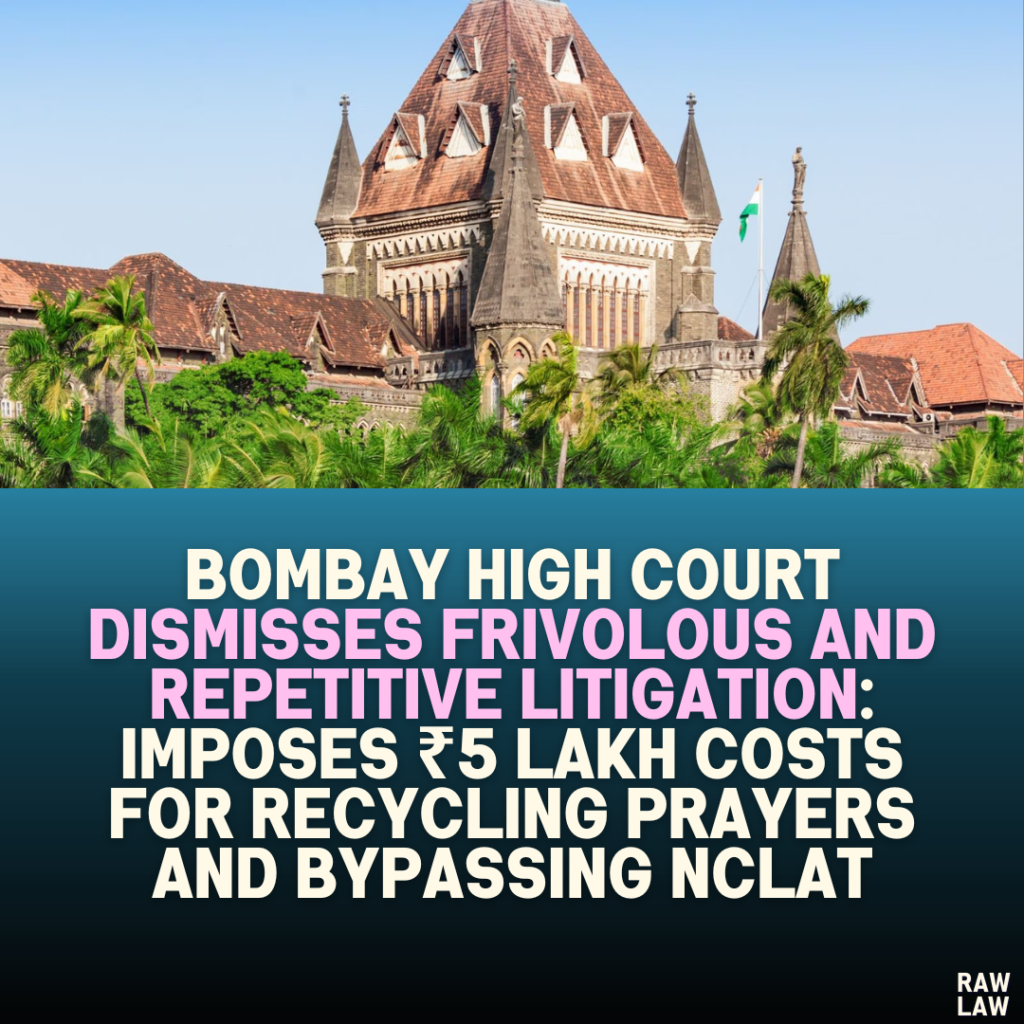Court’s Decision
The Bombay High Court dismissed the petitioner’s writ petition challenging multiple orders passed by the NCLT under the Insolvency and Bankruptcy Code (IBC). The Court imposed costs of ₹5 lakhs on the petitioner for engaging in frivolous, repetitive, and unsubstantiated litigation, terming it an abuse of judicial process. The Court highlighted the misuse of its writ jurisdiction and emphasized the need for litigants to exhaust statutory remedies.
Facts
- Background of the Case:
- The petitioner, Mrs. Manisha Nimesh Mehta, a promoter of M/s. Perfect Infraengineers Ltd., challenged the orders of the NCLT and NCLAT pertaining to insolvency proceedings initiated against the company by creditors, including ICICI Bank and the Technology Development Board (TDB).
- The petitioner also alleged wrongful classification of accounts as NPAs during the COVID-19 moratorium and unauthorized adjustments by ICICI Bank.
- Reliefs Sought:
- The petitioner sought to declare sections of the SARFAESI Act, RDB Act, and IBC unconstitutional, alleging that they unfairly favored creditors.
- Relief was also sought against ICICI Bank and other creditors for alleged malafide actions, including misuse of statutory remedies.
- Prior Litigation History:
- The Court noted that the petitioner had filed multiple petitions with overlapping prayers, essentially re-litigating issues already decided by various forums, including the NCLT and appellate authorities.
Issues
- Whether the petitioner’s allegations against the NCLT and its members, including claims of coram non judice, had merit.
- Whether the statutory provisions challenged by the petitioner violated her fundamental rights.
- Whether the petitioner abused the judicial process by filing repetitive petitions with no new grounds or substantive claims.
Petitioner’s Arguments
- Malafide Actions by Creditors:
- The petitioner accused ICICI Bank and TDB of violating contractual and statutory obligations, particularly during the COVID-19 moratorium.
- Jurisdictional Challenge:
- The petitioner alleged that the NCLT and NCLAT lacked jurisdiction to adjudicate the matter.
- Constitutional Validity:
- It was argued that various provisions of the IBC and related statutes violated fundamental rights, being skewed in favor of creditors and detrimental to MSMEs.
- Special Protection for MSMEs:
- The petitioner contended that as an MSME, the company was entitled to protections under the MSMED Act, which were ignored in the insolvency proceedings.
Respondent’s Arguments
- Compliance with Statutory Provisions:
- The respondents, including ICICI Bank and TDB, argued that all actions were conducted in compliance with the IBC and related laws.
- Abuse of Process:
- The respondents highlighted the petitioner’s history of repetitive and unsubstantiated litigation, terming it an attempt to delay insolvency proceedings.
- Failure to Exhaust Remedies:
- It was argued that the petitioner failed to approach the NCLAT, the appropriate appellate forum, instead misusing the writ jurisdiction of the High Court.
Analysis of the Law
- Section 7 of the IBC:
- The provision allows financial creditors to initiate insolvency proceedings upon proving default.
- Writ Jurisdiction under Article 226:
- The Court reiterated that writ jurisdiction is not a substitute for statutory remedies and must be exercised sparingly.
- Judicial Precedents:
- Glaxo Smith Kline Consumer Healthcare Ltd. v. Assistant Commissioner (CT): Emphasized exhausting statutory remedies before invoking writ jurisdiction.
- Swiss Ribbons Pvt. Ltd. v. Union of India: Reiterated the IBC’s constitutional validity and the need for expeditious resolution of insolvency cases.
Precedent Analysis
- The Court referred to multiple judgments that discourage forum shopping and repetitive litigation, emphasizing the importance of procedural discipline.
Court’s Reasoning
- Frivolous Litigation:
- The Court found that the petitioner engaged in “copy-paste litigation,” recycling prayers from previous petitions without presenting any substantial new grounds.
- Failure to Exhaust Remedies:
- The Court noted that the petitioner bypassed the NCLAT and directly approached the High Court, violating procedural norms.
- Abuse of Judicial Process:
- The petitioner’s actions were deemed an abuse of the court’s time and resources, meriting imposition of exemplary costs.
Conclusion
The High Court dismissed the writ petition, terming it frivolous and an abuse of process. The Court imposed costs of ₹5 lakhs on the petitioner to deter similar misuse of judicial forums in the future. It directed the NCLT to proceed with the insolvency resolution process expeditiously, ensuring that all parties are given a fair opportunity to present their cases.



